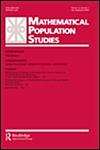Kalman 1960: The birth of modern system theory
IF 1.3
3区 社会学
Q3 DEMOGRAPHY
引用次数: 2
Abstract
ABSTRACT Rudolph E. Kalman is mainly known for the Kalman filter, first published in 1960. In this year, he published two equally important contributions, one about linear state space system theory and the other about linear quadratic optimal control theory. These three domains are intertwined in the later theory of linear quadratic Gaussian control. An extended version of linear quadratic optimal control is put into practice in an example of cooperation in population ecology.卡尔曼1960:现代系统理论的诞生
摘要Rudolph E.Kalman主要以卡尔曼滤波器而闻名,最早发表于1960年。在这一年里,他发表了两篇同样重要的文章,一篇是关于线性状态空间系统理论,另一篇是线性二次型最优控制理论。这三个领域在后来的线性二次高斯控制理论中交织在一起。以种群生态学中的合作为例,将线性二次型最优控制的扩展版本付诸实践。
本文章由计算机程序翻译,如有差异,请以英文原文为准。
求助全文
约1分钟内获得全文
求助全文
来源期刊

Mathematical Population Studies
数学-数学跨学科应用
CiteScore
3.20
自引率
11.10%
发文量
7
审稿时长
>12 weeks
期刊介绍:
Mathematical Population Studies publishes carefully selected research papers in the mathematical and statistical study of populations. The journal is strongly interdisciplinary and invites contributions by mathematicians, demographers, (bio)statisticians, sociologists, economists, biologists, epidemiologists, actuaries, geographers, and others who are interested in the mathematical formulation of population-related questions.
The scope covers both theoretical and empirical work. Manuscripts should be sent to Manuscript central for review. The editor-in-chief has final say on the suitability for publication.
 求助内容:
求助内容: 应助结果提醒方式:
应助结果提醒方式:


